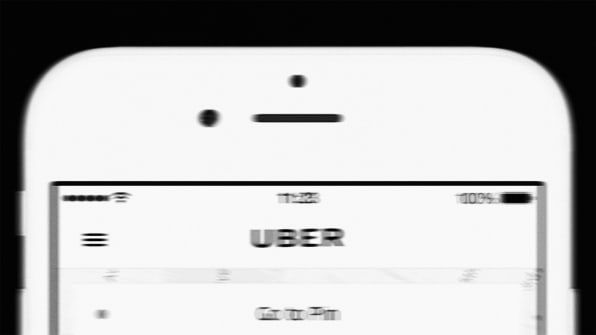Uber Drivers Don’t Think Travis Kalanick’s Departure Will Improve Their Work Conditions
Thursday morning, on the hot steps of New York’s City Hall, a group of 15 Uber drivers gathered to celebrate a piece of legislation that would require ride-hailing platforms to enable customers to tip. For six years drivers have asked Uber to create an experience where clients could reward them with a few extra bucks for a job well done. But Uber was steadfast in its refusal. That was until last week.
On Tuesday, Uber announced 180 days of change for drivers, including the addition of tipping. The abrupt change in position is part of an overhaul to improve the scandal-plagued company’s image after the loss of several executives including CEO Travis Kalanick.
New York City drivers say that they are the ones who forced the company’s hand to make the change. “Even though we’re putting pressure on them,” says Jose Molina, an Uber driver and member of the Independent Drivers Guild, “at the end of the day they take the credit for it.”
It’s this sort of failure to acknowledge drivers that makes them feel little real change is coming to the company or the platform. But some drivers have been heartened by Kalanick’s departure. “I think they needed somebody different,” says Michele Dottin, a driver from Brooklyn. “He’s not considering the people and the drivers who are really the ones who keep your business. Without drivers, you have zero business—I don’t care how you slice it.”
Dottin, who has a short sweep of purple-gray hair, started driving for Uber a little more than a year and a half ago. Her niece talked her into it, by noting how much she loved meeting people. As a former executive assistant, she’s used to working long hours. The difference is that before when she was working 10-to-12-hour shifts behind a desk she could look forward to a weekend. Now she’s working every day. “I have to force myself to take a day to recoup,” she says.
Sunken wages are a primary concern for drivers, who feel overworked by Uber. Still, the consternation among the dozen drivers I spoke with went well beyond money. It is not that they think that Uber’s whole system has been designed against them, but rather without them in mind. For example, drivers sometimes have to return phones left behind by riders. Doing so is an arduous task requiring drivers to spend time and fuel without compensation.
Even when the company does seem to keep drivers in mind, like when it created a digital queue for fare pickups at La Guardia airport so drivers could park and not waste fuel while they wait to be matched with a rider, the drivers say that the company doesn’t listen when problems arise. In the case of the airport queue, the system relies on mobile connectivity. One driver told me that he has had to wait multiple times up to five hours to get a fare at the airport, because of inconsistent mobile reception. He had asked Uber to arrange for Wi-Fi at the airport for drivers, but has never heard back. Often, drivers told me, Uber sends them blanket responses when they make suggestions.
“If you’re sending a generic response then you’re not addressing the issue,” says Dottin. Between an ill-conceived driver experience, weak fare pricing, and a general non-responsiveness to their gripes, they say it’s become clear that the person leading the company isn’t concerned about their needs or wants.
“It starts at the top and it trickles down,” says driver Freddy Tello. He says that he believes that Kalanick should have been out a long time ago. But he doesn’t really think anything is going to change at Uber even with him gone. That’s in part, he says, because Kalanick isn’t really going anywhere—he’s still on the board. It’s also because it might be hard to undo the knots that Uber has already tied.
“The culture is embedded over five years,” he says, sitting among a band of fellow drivers in a shady portion of the stairs leading up to City Hall. “I know the board of directors and investors want different outcomes, but it would take a while to change the entire mentality that this guy set.” Tello says he believes that the company prizes low prices in order to grow quickly and maintain majority market share.

There are other components of Uber’s business that will be hard to reverse. Customers have become accustomed to cheap trips where they don’t have to do anything but exit a car when they’re done. Not tipping has become routine and customers may find that habit hard to break. Also, with denigrated pricing has come behavior that results from a service so affordable anyone can use it.
“When you try and offer for the cheapest price you’re going to get the worst clients,” says Arturo Canelas, leaning his gaunt face into the cluster of drivers to be better heard. Everyone lets out sighs of sympathetic exasperation.
Tello relays a story wherein one of his fares came over to his car carrying an oil-wet slice of pizza. He says he told the would-be passenger she couldn’t get in his car with food and she promised that she would be clean and careful, “like I’ve never heard that before,” he scoffs. “I’m like, no absolutely not.”
Dottin chimes in, “When you tell them no you can’t do that, they make a mess in your car [on purpose].”
The number of alterations necessary to fit the platform to the needs of the drivers will take more than a single expert tailor. But Tello and his compatriots don’t see the incentive for change. “From day one their long-term goals have always been autonomous cars,” he says. “That tells you that they don’t give a shit about the driver—why should they? They could [have] 24-hour driving and they’ll never hear complaints from anyone.” He pauses and chuckles, “except passengers who are about to get in a car that’s been thrown up in all over the place.”
A knowing laughter rumbles through the drivers and drifts away like a car speeding off.
“The culture is embedded over five years. It would take a while to change the entire mentality that this guy set.”
Thursday morning, on the hot steps of New York’s City Hall, a group of 15 Uber drivers gathered to celebrate a piece of legislation that would require ride-hailing platforms to enable customers to tip. For six years drivers have asked Uber to create an experience where clients could reward them with a few extra bucks for a job well done. But Uber was steadfast in its refusal. That was until last week.
Fast Company , Read Full Story
(37)













